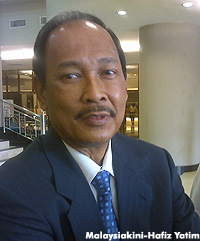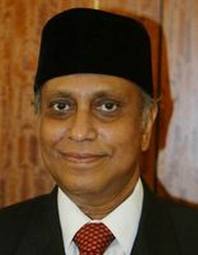William Pesek, a prominent Bloomberg columnist, wrote recently that the global outcry over the loss of flight MH370 has highlighted the country’s deepest flaws of incompetent people running the country
why A-G Gani never charged Tajudin Ramli for the losses of RM 8 billion that MAS suffered despite recommendations by Dato Ramli Yusuff. Dato Mat Zain Ibrahim, former KL OCCI also swore SDs about A-G Gani Patail throwing away the Batu Putih case for pecuniary gains.
 Yet Gani Patail remains as the A-G of Malaysia, leading many to speculate that he has a grip on PM Najib Razak because of Razak Baginda’s acquittal in the murder of the Mongolian beauty, Altantuya Shariibu. In that case, the A-G did not appeal against Razak Baginda’s acquittal.
Yet Gani Patail remains as the A-G of Malaysia, leading many to speculate that he has a grip on PM Najib Razak because of Razak Baginda’s acquittal in the murder of the Mongolian beauty, Altantuya Shariibu. In that case, the A-G did not appeal against Razak Baginda’s acquittal.
On the other hand, the A-G has pursued criminal appeals against certain people like Lawyer Rosli Dahlan and Dato Ramli Yusuff (left). In the PKFZ case, A-G Gani Patail charged and appealed against the acquittal of Tun Ling Liong Sik which led to Tun Lingcalling him – “ That Stupid Fella”.
The MAS scandal is like a fiery comet flying across the sky. It has brought a trail of other scandals into light. The anonymous blogs are now saying that the losses which MAS suffered during Tajuddin Ramli’s time was not true. That it was just a just a fiction. That MAS was never heading towards bankruptcy and the Widespread Asset Unbundling (WAU) exercise was a scam. Who created the fiction and the scam?
a first time MP of UMNO, has raised everybody’s hackles by asking
MP for Titiwangsa Datuk Johari Abdul Ghani,has asked a three-month old company which wants to rescue ailing Malaysia Airlines (MAS) to "show us your money first and who your financial backers are" before the proposal can be taken seriously. It must be able to distinguish between bad and criminal decisions, and between mere mistakes and crookery. Fast decision-making requires the use of discretion, short-cutting wooden procedures. To treat every use of discretion as criminal is plain wrong, and a recipe for paralyzing decision-making.Part of the problem lies in a silly legal provision which says that if a decision benefits any private party, the bureaucrat concerned can be charged with corruption even if there is no evidence that he gained personally. A more stupid provision would be difficult to imagine. Can there be any decision that does not benefit somebody? And if indeed there are some decisions that benefit absolutely nobody, would such decisions be worth taking? Khazanah, found itself embroiled in one scam after another questions that Johari has asked,we must insist on reviewing who are the top management team the newco is bringing on board.What are their specific business plans,specific actions and remedies they are going to take in order to revive Mas positively without conditions imposed...period..Also their background in this business.No instant entrepreneur like Instant Noodles can do
.Johari, who is also an Umno Supreme Council member, said it is wrong for anyone to just pick and choose only the profitable units of MAS because running the airline is a portfolio by itself.
Good, sensible, logical and the right few due deligence questions by Johari. Since this is the first time Johari is speaking up, Jentayu managing director Feriz Omar only knows how to rape and plunder a company. Kudos to Johari telling them to go fly kite.Johari you have made a very good and fair statement.That is what sensible Malaysia should be.
"If MAS can be given to any Tom, Dick and Harry or anyone who can come up with a working paper, I am afraid the problems MAS went through when it was privatised to a corporate figure will recur. We are not going to repeat the same mistake," he said of the 1994 failed privatisation when Tan Sri Tajudin Ramli took over the airline.readmore khazanah's Nor Mohamed Yakcop found himself embroiled in one scam after another
Good, sensible, logical and the right few due deligence questions by Johari. Since this is the first time Johari is speaking up, Jentayu managing director Feriz Omar only knows how to rape and plunder a company. Kudos to Johari telling them to go fly kite.Johari you have made a very good and fair statement.That is what sensible Malaysia should be.
"If MAS can be given to any Tom, Dick and Harry or anyone who can come up with a working paper, I am afraid the problems MAS went through when it was privatised to a corporate figure will recur. We are not going to repeat the same mistake," he said of the 1994 failed privatisation when Tan Sri Tajudin Ramli took over the airline.readmore khazanah's Nor Mohamed Yakcop found himself embroiled in one scam after another
Former MAS Managing Director must answer
The best person to answer this question is Dato’ Seri Idris Jala. He was once MAS Managing Director, now entrusted by Prime Minister Najib to implement the country’s Economic Transformation Plan (ETP). It was during Idris’ time that MAS pursued criminal and civil avenues to hold Tajuddin liable for MAS’ losses. So let Idris answer if the losses were just fiction. If it was fiction, then we have a lot to worry in leaving the whole country’s economic fortunes in the hands of Idris Jala.
Khazanah said the appointments were deliberated and resolved at the meeting of the Khazanah Board of Directors, chaired by Prime Minister Datuk Seri Najib Razak today.


A new conspiracy theory is that was booted out Tajuddin by Minister in the Prime Minister’s Department (Economic Planning Unit) Tan Sri Nor Mohamed Yakcop.,the MACC did charged Nor Mohamed Yakcop’s former political secretary, Hasbie Satar, for money-laundering. Hasbie, 37, from Sarawak (Idris Jala’s home state) appeared alone and unrepresented when he was charged under Section 4 (1) of the Anti-Money Laundering and Anti-Terrorism Financing Act 2001. This offence carries a fine of RM5million or jail term of five years.
 Prime Minister Najib Abdul Razak today said democracy was "thriving" in Malaysia and argued the Sedition Act had to be retained due to the lack of "mutual respect" between races.
Prime Minister Najib Abdul Razak today said democracy was "thriving" in Malaysia and argued the Sedition Act had to be retained due to the lack of "mutual respect" between races.
It is easier to be non-violent physically than in speech; the latter requires greater self-control. Likewise, it is not as difficult to frame unambiguous laws against murder and physical harm as it is to stem the flow of hateful words. This is because there are so many intangibles at work here. It is so simple, almost effortless, to toss aside objections against harsh language by saying that it was not meant to hurt, or, even if it did, hard luck, facts are facts.Over the past decades, this has precisely been the experience in our democracy. Even when India was fighting for Independence, our leaders conducted their opposition to colonial rule in a language that only added to their dignity. Those were very hard times, but res-traint held and the Gandhian spirit remained uppermost. This practice continued after Independence too; again these were very troubled years especially those after Partition, but Parliament conducted itself with decorum.
Paradoxically, as our country got more prosperous, more stable, less prone to balkanisation, the situation has become worse. It should have been the other way around, but there it is. Things have degenerated to such an extent that now there is actually a premium on abusive and “unparliamentary” language, often in Parliament. There are excuses galore when such incidents happen; either the other side used worse words, or said equally bad things, or, the opposition fully deserved them.
Mahathirist would think otherwise. It is not just sticks and stones that break democracy’s bones but words can also harm it!
Najib badmouthing democracy:
Sedition Act retained not to obstruct democracy but to protect my 2nd wife rosmah, says Najib If that were not to be the case and “we refuse to hear our opponents…we run the risk of missing the truth”. In here lies the link between free speech and democracy, and the connection is an intimate one, logically necessary too. Gandhi said that when we “patiently try to convert our opponents” then, and only then, consensus might be eventually achieved.See you in court Rosmah, PKR rep says of Permata probe Know how to maintain your expensive jewellery
Rosmah’s friend Jho Low used government fund
In 2008, a boisterous young man by the name of Jho Low Taek, a Penang-born Wharton grad with a taste for Cristal champagne and Broadway blondes, approached Malaysia’s Terengganu state government with a proposal to use the state’s authority to sell RM10 billion (US$2.87 billion) in bonds to start a state-backed investment fund.
That proposal has led to what Tony Pua, a DAP lawmaker, has called “the mother of the mother of the mother of all scandals in the history of Malaysia.”Mysterious sovereign wealth fund may be billions in debt
Political insiders in Malaysia say Prime Minister Najib Tun Razak could be facing a fresh political crisis due to the murky dealings of a sovereign fund established five years ago to drive investment in strategic domestic industries.
A widening circle of critics, fed in part by exhaustive reporting on independent news sites such as Malaysiakini, say the fund may have run up as much as RM40 billion (US$12.18 billion) in debt and has few assets to show for it beyond what are described as overpriced acquisitions of independent power producers in Malaysia.
On Feb. 18, opposition MP Tony Pua of the Democratic Action Party announced on the floor of Parliament that the fund, 1Malaysia Development Bhd, known as 1MDB, had yet to file accounts for the financial year ended March 2013 and that KPMG, the independent auditor, had suddenly resigned. Deloitte Malaysia has since taken over the accounts.
In 2012, 1MDB made a US$1.75 billion private bond placement, one of the biggest private US dollar bond placements on record from Asia, through Goldman Sachs, to acquire a portfolio of power assets. Other bond placements also have been made. According to US laws, failure to file financial accounts is a violation of the law, which should be raising concerns among the bondholders.
‘Bold and Daring’A United Malays National Organization operative told Asia Sentinel a major scandal is lurking in the fund, which is wholly owned by the country’s Ministry of Finance, although no clear evidence has emerged of the exact nature of the scandal.
Former Prime Minister Mahathir Mohamad and former Finance Minister Daim Zainuddin, both of whom have soured on Najib, are said to be questioning the operation of the fund. There has been a rising tide of gossip about the fund’s political connections, particularly to Najib’s wife, Rosmah Mansor, and a close friend, Low Taek Jho, who was active in founding the fund.
Jho Low, as he is known, has become a New York social figure, seen out with Paris Hilton and pouring Cristal champagne for a succession of showgirls. He and Rosmah’s son by her first marriage, Riza Aziz, produced The Wolf of Wall Street, a major box office success that has been nominated for a Best Picture Oscar. Ironically, the film can’t be shown in Malaysia because of its excess profanity.
Low reportedly was behind Wynton Group, which showed an interest in bidding for the famed Claridge’s, Berkeley and Connaught hotels in London. According to a Malaysian website, in a court document filed in Ireland, Low made the approach in 2010. According to the court filing, Low was said to have had the backing of an unnamed Malaysian “sovereign wealth fund,” which was not named. Low has acknowledged having friends in Khazanah Nasional Bhd, another Malaysian sovereign wealth fund. The 1MDB fund wasn’t mentioned
Little is known of 1MDB’s operations. As Asia Sentinel reported at the time, it raised hackles when it started in April 2009 as a fund arranged by Jho Low and started by the Terengganu state government, which borrowed RM10 billion (US$2.87 billion at 2009 rates). Critics questioned why an oil-rich state with revenues of RM5-7 billion a year would have to borrow money to start a sovereign fund rather than using windfall revenues from oil and other commodity bonanzas.
The Terengganu fund morphed into 1MBD under the Ministry of Finance in September 2009 to “focus on strategic development projects in the areas of energy, real estate, tourism and agribusiness.” The fund’s website quotes Najib saying its mission is to “be bold and daring… to break new ground and do things differently.”
1MDB soon acquired a strategic partner in an obscure Saudi firm, PetroSaudi International, headed by Tarek Essam Ahmad Obaid, a member of the vast Saudi royal family. Reports indicated that PetroSaudi had signed a memorandum of understanding with Ghana National Petroleum Corp. although the MOU has apparently not resulted in a major project.
According to a statement by Azmi Khalid, the chairman of the parliament’s Public Accounts Committee, 1MDB loaned PetroSaudi about US$1billion, leading to additional questions over why a government fund set up to explore investment in Malaysia was loaning money to a joint venture in Africa. PetroSaudi, despite rumored ties to the Saudi royalty, was unable to come up with its own cash in the joint venture but got 1MDB to accept a potential oil site in Turkmenistan. Subsequently, the loans to PetroSaudi climbed to US$1.7 billion.
Debt and not much elseAn exhaustive probe of the sovereign fund by writers Ho Kay Tat and Afiq Isa for the Malaysian publication The Edge, found that about all 1MDB has to show so far “is a multi-billion ringgit debt portfolio, the bulk of which was used to buy several independent power producers at hefty price tags.”
Its main asset is a 48-hectare chunk of land passed to the fund by the government when the Malaysian Air Force closed its base at Sungai Besi, near downtown Kuala Lumpur’s Golden Triangle. It is a near-priceless plot that 1MBD is to develop as a financial center called the Tun Razak Exchange, named for Najib’s late father. That work hasn’t started yet.
Through a series of complicated financial engineering moves in 2012, the loan to PetroSaudi was prematurely terminated and redeemed, according to Tony Pua’s presentation on the floor of Parliament.
“However,” Pua said, “the repayment of US$2.32 billion (RM7.93b) was made in a perplexing manner in a “segregated investment portfolio” based in the Cayman Islands. To date no one has been able to verify with any certainty who the investment portfolio manager is, the fund’s performance or for that matter, if the money actually exists.”
The “investment” in the Cayman Islands, Pua said, “raises highly suspicious questions as 1MDB is desperately trying to raise funds through new bond issuance in Malaysia to fund its aggressive acquisitions of independent power producers as well as its mega-projects in Bandar Malaysia and Tun Razak Exchange. In fact, 1MDB is already laden with an estimated more than RM40 billion in debt, and hence such investments is a luxury that 1MDB does not have.”
KPMG, in 1MDB’s first financial statement in 2010, raised an “emphasis of matter” over a US$1 billion investment in the PetroSaudi joint venture, which was subsequently converted into a US$1.2 billion (RM3.95b) loan within a period of less than six months. The “emphasis of matter” was removed in subsequent financial accounts as the joint venture was servicing the loan with interest payments, it was also highlighted that 1MDB extended an additional US$700 million (RM2.3b) in loans to the JV, despite receiving less than US$200 million in interest between 2011 and 2012.
To date, no one has been able to verify with any certainty who the investment portfolio manager is, the fund’s performance or for that matter, if the money actually exists, Pua said.
No comments:
Post a Comment